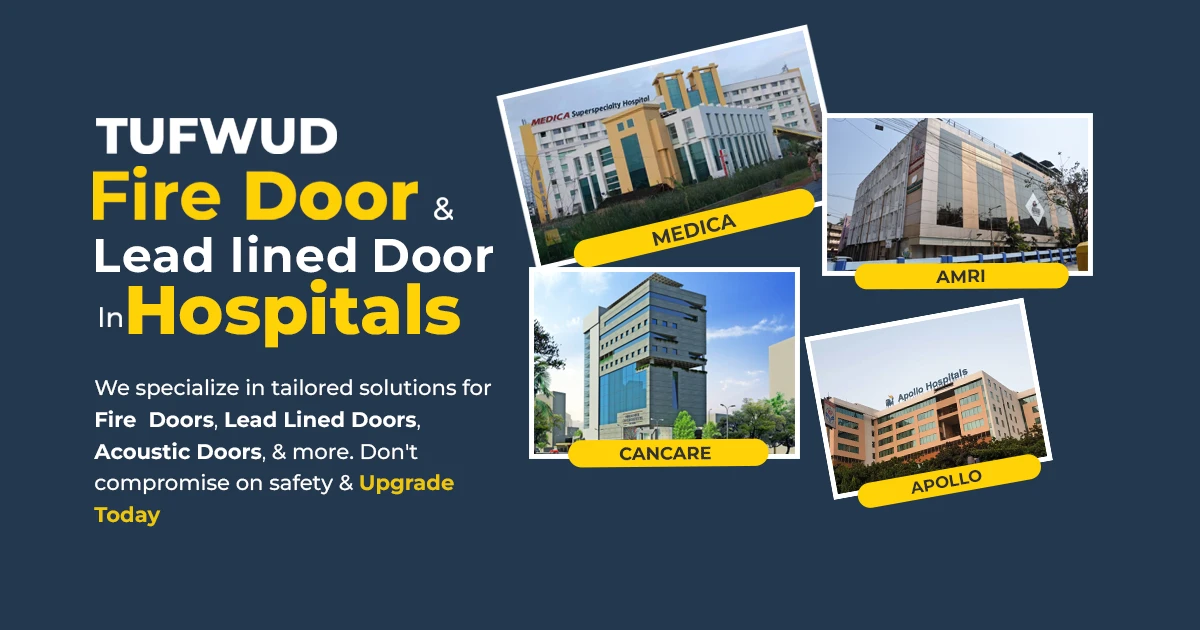Fire Doors for Hospital: Their Significance and the Dangers of Non-Compliance
In every facility, but particularly in hospitals where vulnerable people might not be able to leave quickly, fire safety is crucial. Fire doors are essential for safeguarding escape routes, limiting facility damage, and stopping the spread of smoke and fire. This article examines the value of fire doors in medical facilities, the regulations governing their compliance, and the risks associated with non-compliant fire doors. We’ll also talk about radiation shielding using lead-lined doors.
The Role of Fire Doors in Hospitals
Fire doors are a key component of a hospital’s fire protection strategy. They are specially designed to resist fire for a specific period, typically 60 to 120 minutes. Fully insulated fire doors are preferred which adds to the safety. By compartmentalizing the building, fire doors prevent fire and smoke from spreading between areas, buying valuable time for evacuation. In hospitals, where many patients may be immobile or incapacitated, this time is critical.
Additionally, fire doors for hospital help protect expensive medical equipment and critical systems such as oxygen supplies and electrical panels. Limiting fire spread ensures these vital resources remain operational during an emergency.
Fire Door Compliance Requirements
Hospital fire doors must meet local construction codes and fire safety requirements, such as those set forth by the National Fire Protection Association (NFPA) and the National Construction Code (NBC) of India. fire rated doors for hospitals need to fulfill the following requirements to comply:
Fire Rating: To successfully divide spaces in a hospital, fire doors need to be able to survive fire for at least 60 to 90 minutes.
Self-Closing systems: To guarantee that fire doors stay closed in the case of a fire, they must be equipped with automated self-closing systems.
Smoke Seals: Smoke, even when not in direct contact with flames, can be fatal, so it must be prevented from passing through with the installation of appropriate smoke seals.
Frequent Inspections: Frequent inspections are necessary to verify that closing mechanisms, seals, and hinges are in good shape and operating as intended.
Expert Installation: It’s important to install things correctly. To guarantee that fire doors satisfy safety regulations, they should only be installed by qualified personnel.
Non-Compliant Fire Doors’ Dangers
A hospital’s non-compliant fire doors pose a risk to patient safety. Doors that don’t meet regulations might not close correctly, have insufficient fire ratings, or not have the required seals. Tufwud doors will not be able to control smoke and flames in the event of a fire, which will allow the fire to spread quickly, restrict evacuation routes, and increase the risk to patients, staff, and visitors.
Unchecked smoke spread can be particularly harmful since it might enter treatment facilities and wards, where patients might not be able to react appropriately. Since smoke inhalation is one of the main causes of fire-related deaths, effective smoke containment is essential.
Beyond safety risks, hospitals with non-compliant fire doors may face legal and financial consequences. Regulatory violations can result in fines, lawsuits, or even the suspension of hospital operations. A hospital’s reputation could also be severely damaged, and public trust eroded.
Lead-Lined Doors in Hospitals
In areas such as X-ray rooms and radiation therapy suites, hospitals also require lead-lined doors to protect against radiation. These doors contain lead cores designed to prevent radiation leakage, ensuring both patients and staff are shielded from harmful exposure.
Lead-lined doors, like fire doors, must meet strict safety standards to ensure adequate protection. Proper installation is also crucial for ensuring they meet the required radiation shielding performance.
In summary
Hospitals need fire doors in order to be protected from the risks of smoke and fire. Adherence to fire door rules is essential for guaranteeing the security of patients, personnel, and guests. Non-compliant fire doors are extremely dangerous since they jeopardize patient safety as well as the hospital’s ability to operate. Lead-lined doors, on the other hand, offer vital radiation protection in designated areas and are therefore essential in contemporary hospital settings.
At Tufwud, we offer premium fire-rated, insulated, and lead-lined doors designed to meet the highest safety standards. Protect your hospital and its occupants—choose insulated, choose Tufwud.



